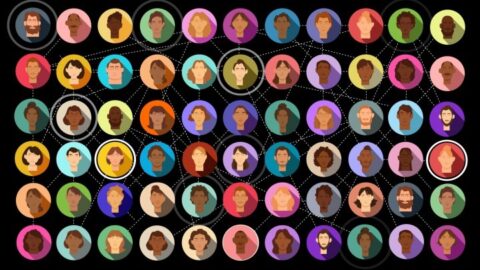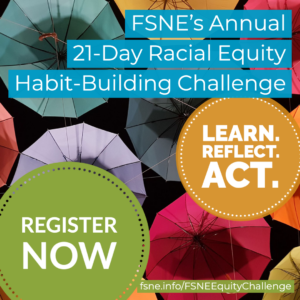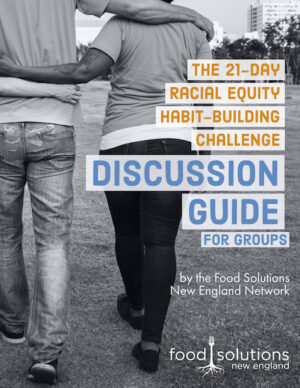An Ever-Evolving Journey: On Moving to Equitable Wellbeing and Belonging
March 7, 2023 Leave a comment“The project of our society is to constantly re-imagine how we belong together.“
Bridgit Antoinette Evans’
This year, we are again excited to partner with Food Solutions New England on the 21 Day Racial Equity Habit Building Challenge. This will be the 9th offering of what began as an experiment to bring a region together in exploration of the connection between race, racism and the food system, and what can be done to ensure equity and fairness across all lines of identity. Each year the Challenge has evolved, including more and different resources, topics, tools, and features. And the number of participants has grown from roughly 250 in the first year to several thousand over the last five years, with a total of more than 30,000 people signing up from all 50 US states and over 30 other countries. For more on this evolution, see this post.
What we wanted to highlight this year is that we are framing everything under the theme of “Moving to equitable wellbeing and belonging in food systems and beyond.” Why wellbeing and belonging? Because most everyone can relate to the ideas of wellbeing and belonging. Also because this phrase can help to answer the question regarding what some of the big goals are of doing racial and other forms of “equity work.”
At a time when we might feel confused about what it means to work for equity and justice, and when many words have become political footballs, we find that focusing on the core values and destinations of equitable wellbeing and belonging can help to ground and focus people. This is especially so when we focus on definitions of wellbeing and belonging that (1) most if not all people across identities can relate to, (2) emphasize the systemic, structural, and social nature of these terms, and (3) help us better understand how racism and other forms of bias and oppression can get in the way and ultimately impact everyone. We are especially fortunate to be able to turn to our partners in and experts on wellbeing at The Full Frame Initiative and on othering at the Othering and Belonging Institute at the University of California at Berkeley.
“We are all wired for wellbeing.” So say our friends at the Full Frame Initiative (FFI). And while this may be the case, they go on to say, “We do not all have a fair shot at wellbeing.” This ends up being due in large part to different kinds of treatment and opportunities that can fall along lines of identity, including race and ethnicity. While this clearly impacts the victims of racism and other -isms, it also ends up impacting everyone in society.
So what is wellbeing? According to FFI,
“Wellbeing is the set of needs and experiences essential, in combination and balance, to weather challenges and have health and hope.”
Wellbeing here is not the same as “wellness,” which often is used in very individualistic kinds of ways – for example, whether or not you are “well” is because of the choices you have made.
The work of FFI around wellbeing also points to five key factors or domains in play, which are largely socially determined:
- Social connectedness to people/communities that allows us to give and to receive, and spaces where we experience belonging to something bigger than ourselves.
- Stability that comes from having things we can count on to be the same from day to day and knowing that a small bump won’t set off a domino-effect of crises.
- Safety, the ability to be ourselves without significant danger or harm.
- Mastery, that comes from being able to influence other people and what happens to us, having a sense of purpose and skills to navigate and negotiate our life.
- Meaningful access to relevant resources like food, housing, clothing, sleep and more, without shame, danger or difficulty.
The first domain above has clear connections to social location and connection. Being embedded and engaged in supportive social networks is a great contributor to individual and collective wellbeing. Beyond this, being connected to others in authentic, caring, and mutually rewarding webs of relationships can contribute to a sense of stability, safety, and purpose, and it can create access to resources (financial and otherwise) that sustain and enliven us.
To learn more about these “five domains of wellbeing” and why they matter for everyone, you can check out the interactive graphic at this link and/or watch the short video below with FFI’s Tanya Tucker.
Belonging. This is a powerful word, feeling, and condition/situation. It is more than inclusion, simply “feeling or being included.” It is about being fundamentally “seen” and “respected.” The concept of belonging has been explored and expressed by many over time, and with great depth, nuance, and relevance more recently by the staff at the Othering and Belonging Institute at the University of California-Berkeley (OBI). OBI contrasts belonging to “othering,” a process which fundamentally denies certain people recognition of their full or even partial humanity. You can watch or listen to a roughly five minute segment of a talk that OBI founder john a. powell gave in 2019 about othering and belonging (see below – start at 9:10 and end at 13:45).
As with the concept of wellbeing, belonging is understood here as being directly connected to power dynamics. According to OBI,
“Belonging means having a meaningful voice and the opportunity to participate in the design of political, social, and cultural structures that shape one’s life — the right to both contribute and make demands upon society and political institutions.”
Belonging then requires power, access, and opportunity among all groups and individuals within a given social structure, such as a society, organization, business, club, etc. And as Brian Stout, ever curious explorer of “building belonging,” writes, “Belonging is a felt sense in our bodies of safety, power, wholeness, and welcome. It is a relational quality that can be cultivated and practiced.”
With this relational and systemic understanding of belonging, we can see how the different “levels of racism,” in food and other systems, can create othering in interpersonal, institutional, and also individually internalized ways, which can and do ripple through the broader fabric of our shared social body, or what Dr. Martin Luther King, Jr. called as our “inescapable network of mutuality, tied in a single garment of destiny.”
If you are interested in further exploring these topics and engaging in this conversation about giving everyone a fair shot at wellbeing, repairing, healing, and building belonging in food systems and beyond, join us for this year’s 21-Day Racial Equity Habit-Building Challenge. Registration information can be found here.
“We are all tied to a lineage of love that has existed since time immemorial. Even if we haven’t had a direct experience of that love, we know that it exists and has made an indelible imprint on our souls. It’s remarkable to think that the entire span of human life exists within each one of us, going all the way back to the hands of the Creator. In our bodies we carry the blood of our ancestors and the seeds of the future generations. We are a living conduit to all life. When we contemplate the vastness of the interwoven network that we are tied to, our individual threads of life seem far less fragile. We are strengthened by who we come from and inspired by the those who will follow.”
– Sherri Mitchell (Weh’na Ha’mu Kwasset)


